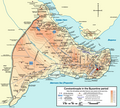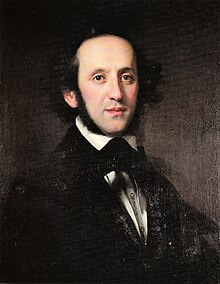Portal:History
The History Portal

Herodotus (c. 484 BC – c. 425 BC) is often
considered the "father of history"
History is the systematic study of the past. As an academic discipline, it analyzes and interprets evidence to construct narratives about what happened and explain why it happened, focusing primarily on the human past. Some theorists categorize history as a social science, while others see it as part of the humanities or consider it a hybrid discipline. Similar debates surround the purpose of history, for example, whether its main aim is theoretical, to uncover the truth, or practical, to learn lessons from the past. In a slightly different sense, the term history refers not to an academic field but to the past itself or to individual texts about the past.
History is a broad discipline encompassing many branches. Some focus on specific time periods, such as ancient history, while others concentrate on particular geographic regions, such as the history of Africa. Thematic categorizations include political history, social history, and economic history. Branches associated with specific research methods are quantitative history, comparative history, and oral history.
Historical research relies on primary and secondary sources to reconstruct past events and validate interpretations. Source criticism is used to evaluate these sources, assessing their authenticity, content, and reliability. Historians integrate the perspectives of several individual sources to develop a coherent narrative. Different schools of thought, such as positivism, the Annales school, Marxism, and postmodernism, have distinct methodological implications.
History emerged as a field of inquiry in the ancient period to replace myth-infused narratives, with influential early traditions originating in Greece, China, and later also in the Islamic world. Historical writing evolved throughout the ages and became increasingly professional, particularly during the 19th century, when a rigorous methodology and various academic institutions were established. History is related to many fields, including historiography, philosophy, education, and politics. (Full article...)
Featured picture
Did you know (auto generated)

- ... that prehistoric women may have had unique advantages over men in endurance hunting due to the positive effects of estrogen on muscle development?
- ... that 25 Water Street was designed to blend in with historic brick buildings that no longer exist?
- ... that the first draft pick in New England Patriots' history, Gerhard Schwedes, was born in Nazi Germany?
- ... that the elite men's race at today's London Marathon is expected to feature three of the five fastest men in history?
- ... that Art Rooney Jr. presided over what one Pro Football Hall of Fame selector described as "the best drafting run in NFL history"?
- ... that former Arizona Cardinals kicker Cedric Oglesby, one of the first African-American kickers in NFL history, received his chance to play when the team's previous kicker injured himself celebrating?
Jakob Ludwig Felix Mendelssohn Bartholdy (3 February 1809 – 4 November 1847), widely known as Felix Mendelssohn, was a German composer, pianist, organist and conductor of the early Romantic period. Mendelssohn's compositions include symphonies, concertos, piano music, organ music and chamber music. His best-known works include the overture and incidental music for A Midsummer Night's Dream (which includes his "Wedding March"), the Italian and Scottish Symphonies, the oratorios St. Paul and Elijah, the Hebrides Overture, the mature Violin Concerto, the String Octet, and the melody used in the Christmas carol "Hark! The Herald Angels Sing". Mendelssohn's Songs Without Words are his most famous solo piano compositions.
Mendelssohn's grandfather was the Jewish philosopher Moses Mendelssohn, but Felix was initially raised without religion until he was baptised aged seven into the Reformed Christian church. He was recognised early as a musical prodigy, but his parents were cautious and did not seek to capitalise on his talent. His sister Fanny Mendelssohn received a similar musical education and was a talented composer and pianist in her own right; some of her early songs were published under her brother's name and her Easter Sonata was for a time mistakenly attributed to him after being lost and rediscovered in the 1970s. (Full article...)
On this day
- 1033 – An assembly at the Abbey of Payerne crowned Conrad II (pictured) king of Burgundy.
- 1725 – J. S. Bach led the first performance of his chorale cantata Mit Fried und Freud ich fahr dahin, BWV 125, based on Luther's paraphrase of the Nunc dimittis.
- 1848 – Mexican–American War: During the American occupation of Mexico City, diplomats signed the Treaty of Guadalupe Hidalgo, which ended the war and had Mexico cede 1.36 million square kilometres (530,000 sq mi) of territory and the United States pay US$15 million.
- 1913 – New York City's Grand Central Terminal, the world's largest train station by number of platforms, opened immediately after midnight.
- 1972 – The Troubles: Protestors burned the British Embassy in Ireland following the massacre of 14 civilians in Derry by British forces.
- Eleanor of Navarre (b. 1426)
- Gertrude Blanch (b. 1897)
- Hannah Ryggen (d. 1970)
- Mary Docherty (d. 2000)
Selected quote
I hate this fast growing tendency to chain men to machines in big factories and deprive them of all joy in their efforts — the plan will lead to cheap men and cheap products.
— Richard Wagner, 19th century German composer
Related portals
More Did you know...
- ... that, when Ghenadie Petrescu (pictured) was ousted from his post of Metropolitan-Primate, Romania experienced protests and riots?
- ... that the British destroyer HMS Highlander escorted Convoy SC 122 through the largest convoy battle of World War II in March 1943 and was unsuccessfully attacked by U-441 and U-608?
- ... that in 1911, John Gaunt's second biplane nearly crashed because a bystander bent the aircraft's elevator before a flight?
- ... that Themistokli Gërmenji, an Albanian nationalist, received the French Croix de Guerre in November 1917, but was executed shortly thereafter by a French military court?
- ... that fish-knives inscribed with Elokeshi's name were sold after her husband decapitated her with a fish-knife following her adulterous affair with a Hindu head-priest?
- ... that the ancient Roman dancer Galeria Copiola reached the age of 104?
- ... that to escape burning at the 1393 Bal des Ardents Charles VI of France huddled under the gown of the Duchesse de Berry, while a lord leaped into a wine vat?
- ... that a junior officer on the USS Ancon refused King George VI entry to the ship's intelligence centre because no one told him the King "was a Bigot"?
Topics
Categories

History • By period • By region • By topic • By ethnic group • Historiography • Archaeology • Books • Maps • Images • Magazines • Organizations • Fictional • Museums • Pseudohistory • Stubs • Timelines • Chronology • People • Wikipedia historians
WikiProjects
![]() WikiProject History •
Ancient Near East • Australian History • Classical Greece and Rome • Dacia • Former countries • History of Canada • Chinese history • European history • Heraldry and vexillology • Indian history • Jewish history • Medieval Scotland • Mesoamerica • Military history • Middle Ages • History of Science
WikiProject History •
Ancient Near East • Australian History • Classical Greece and Rome • Dacia • Former countries • History of Canada • Chinese history • European history • Heraldry and vexillology • Indian history • Jewish history • Medieval Scotland • Mesoamerica • Military history • Middle Ages • History of Science
WikiProject Time • Days of the Year • Years
WikiProject Biography • Composers • Political figures • Saints • United States Presidents
Things you can do
 |
Here are some tasks awaiting attention:
|
Associated Wikimedia
The following Wikimedia Foundation sister projects provide more on this subject:
-
Commons
Free media repository -
Wikibooks
Free textbooks and manuals -
Wikidata
Free knowledge base -
Wikinews
Free-content news -
Wikiquote
Collection of quotations -
Wikisource
Free-content library -
Wikiversity
Free learning tools -
Wiktionary
Dictionary and thesaurus























































